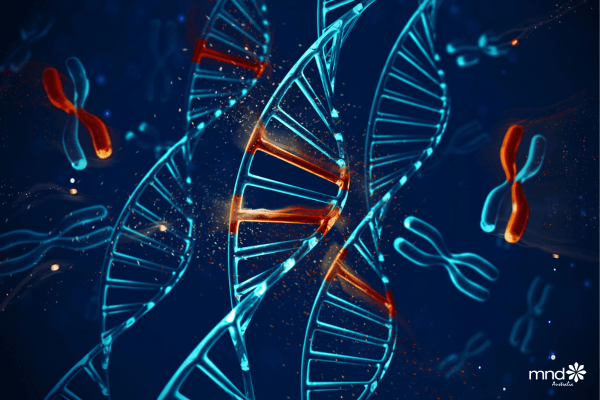Story
Unique challenges for MND gene carriers – findings from 2025 MND Community Survey
Published: 19 August 2025
.png)
People with an asymptomatic MND-related gene change navigate a unique journey. They live with the knowledge of an inherited MND gene change while remaining symptom-free.
Around 15% of MND cases are caused by an inherited MND-related gene, which is called familial MND.
We heard from 29 people with an asymptomatic MND-related gene change in the 2025 MND Community Survey. The results highlight how people with this gene change often feel disconnected, underserved by health professionals, or burdened by stigma.
The isolation gap
According to the Community Survey report, only 30% of people who carry an MND-related gene change feel strongly connected to other family members impacted by MND. A high number (54%) are disconnected from the broader gene-carrier community.
Geographic dispersion, limited awareness of existing support groups and a lack of targeted resources leave many navigating this path alone. This isolation compounds anxiety around an uncertain future and obstructs vital peer learning and support
Varied experiences accessing genetic testing and counselling
There is a lack of public awareness regarding MND genetics and what it means to carry an inherited MND-related gene. This can lead to stigma and misconceptions about genetic risk, fear of judgement or discrimination, or family tensions.
These factors can also impact on timely access to genetic testing and counselling. Only 50% of survey respondents experience timely access to genetic counselling, with reports that some GPs hesitated to refer them for genetic testing.
Genetic counselling services often have a high out-of-pocket cost. This means genetic counselling services may be financially out of reach for some people. Of those who did access genetic counselling, only 46% felt that the service met their needs.
Overcoming these barriers is critical to normalise the experience for people who carry an MND-related gene change and foster early planning.
Limited access to information
A majority of people with an MND-related gene change (63%) reported having ‘little’ or only ‘some’ of the information they have needed. Respondents reported a particular need for regular updates regarding:
- New information about MND-related gene changes
- Results of previous clinical trials genetics
- Availability of new clinical trials that are relevant for gene carriers; and how to participate.
“We want advice on what the current research is and how to access it.”
Top priorities for people living with an MND-related gene change
When asked what would most improve their quality of life, respondents highlighted these top priorities:
- Access to clinical trials (96%)
- Regular neurologist screening (84%)
- Enhanced peer-support platforms (67%)
“I find the Facebook (peer-support) group is the only platform that talks about gene carriers and support for all of us. Not the medical field who I feel are playing catch up.”
These insights underscore the need for inclusive research, seamless clinical pathways, and accessible peer forums.
It’s time to build a stronger support network to ensure people living with an MND-related gene change are informed, empowered and that their voices are amplified.
Where to get information and support
You can find more information about familial MND, including genetic counselling and testing, on the Familial MND fact sheet on our website.
Read the full 2025 Community Survey report for deeper insights: mndaustralia.org.au/communitysurvey
Data drawn from ACIL Allen Pty Ltd. 2025 MND Community Survey Final Report, MND Australia and FightMND, May 2025.


